This is an automatically translated article.
The article is expertly consulted by Master, Doctor Ngo Thi Oanh - Pediatrician - Department of Pediatrics - Neonatology - Vinmec Ha Long International General Hospital.The situation of overweight and obesity in children is increasing day by day, making parents worried. So when should birth weight and young children become worrisome?
1. When does infant and child weight become a concern?
When the child is young, the doctor will monitor the child's growth with a weight-for-height chart. When the child is older, the doctor can now calculate the body mass index (BMI). The chart is used to assess a child's development trends, as well as to help compare the child's development with the average of other children of the same sex in the same age group.Remember that young children need a high-fat diet for their overall development needs. However, too much fat and energy intake in children can easily lead to overweight and obesity. Therefore, please supplement nutrition for children in a scientific way. A child is considered at risk of obesity when the weight is 2-3 kg above the standard weight for the child's developmental age.

Chỉ số BMI giúp bác sĩ tình trạng cân nặng của trẻ
2. Height and weight standards for 2-year-olds
2.1 Weight of a 2-year-old child
The weight and height standards for boys and girls will be different. According to the latest WHO standards, the average weight of a 2-year-old girl is between 11.5 kg and 12.2 kg for a boy. If a 2-year-old's near-weight loss exceeds 20% of the average weight, the child is likely to be overweight. Conversely, if the child's weight is less than 20%, the child is at risk of malnutrition.2.2 Height of 2 year olds
The average height of 2-year-old boys is 87cm and 86.4cm for girls. If the child's height and weight are both low, the child may have rickets or stunting.
Ba mẹ cần chú ý theo dõi chiều cao của trẻ ở mỗi độ tuổi
3. How to keep the child's weight at a reasonable level?
There are various suggestions to help keep the baby's weight at a reasonable level:Maintain a reasonable pregnancy weight during pregnancy: If a woman gains too much weight during pregnancy, increased risk of fetal weight gain. Studies suggest that increased birth weight also increases the risk of childhood obesity. Breastfeeding: Some studies suggest that breastfeeding reduces the risk of childhood obesity.

Nuôi con bằng sữa mẹ sẽ giúp trẻ giảm nguy cơ béo phì
Please dial HOTLINE for more information or register for an appointment HERE. Download MyVinmec app to make appointments faster and to manage your bookings easily.
Article referenced source: mayoclinic.org












